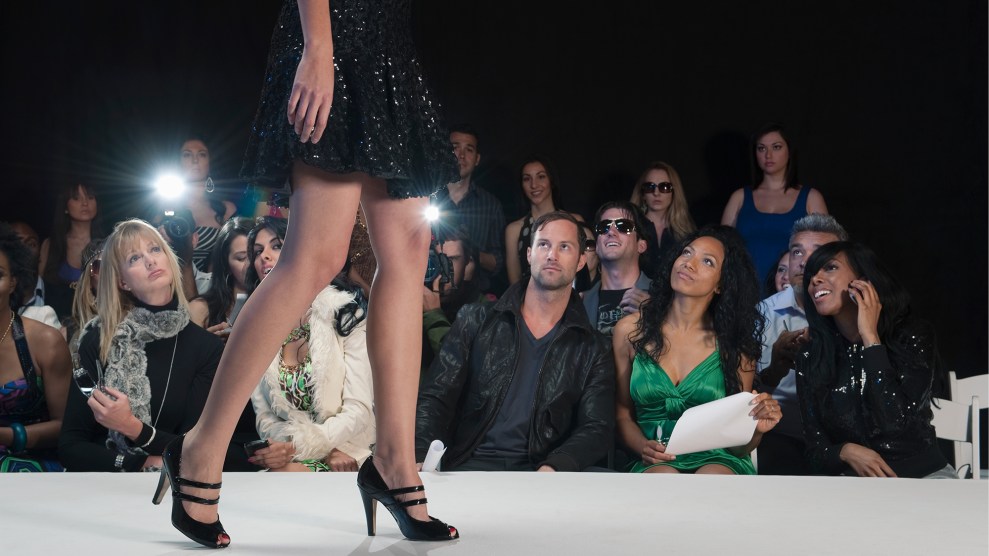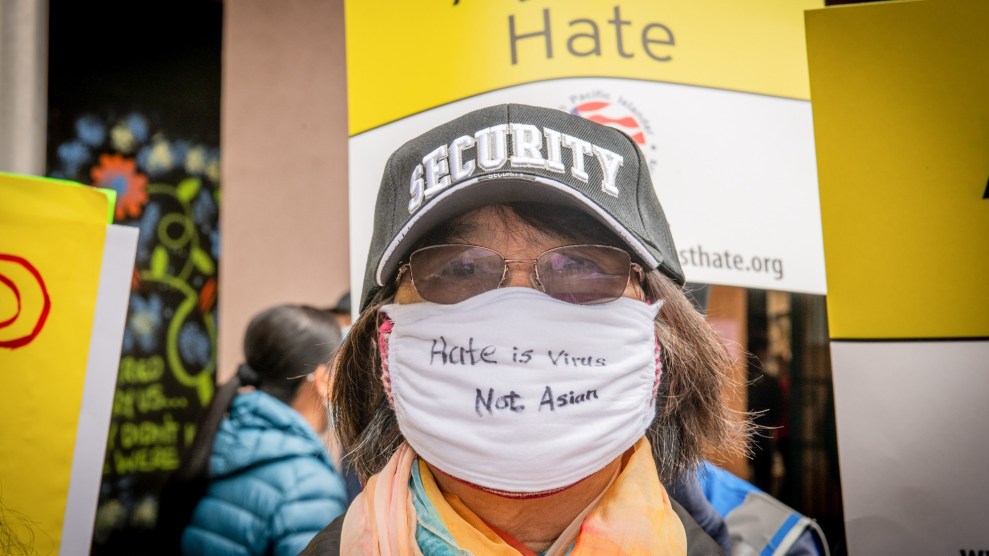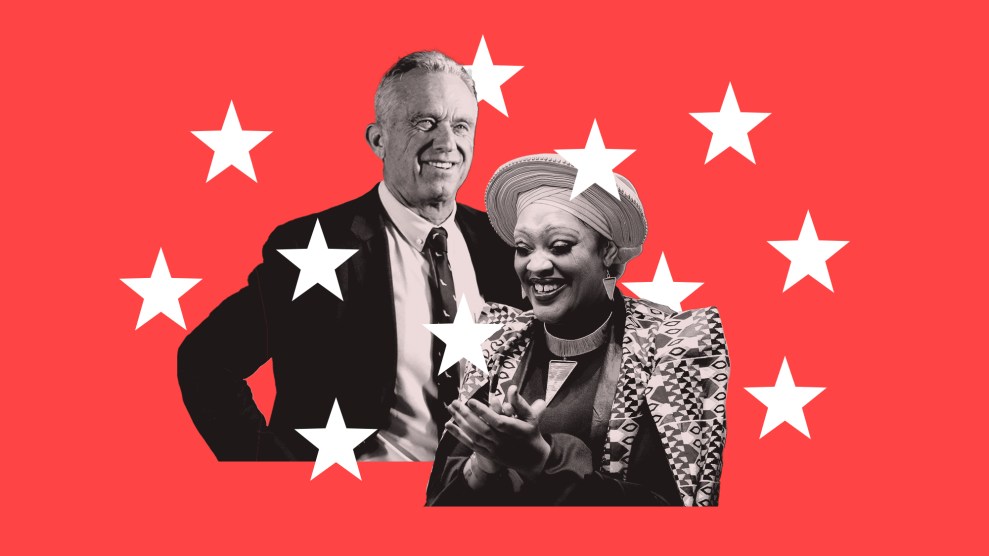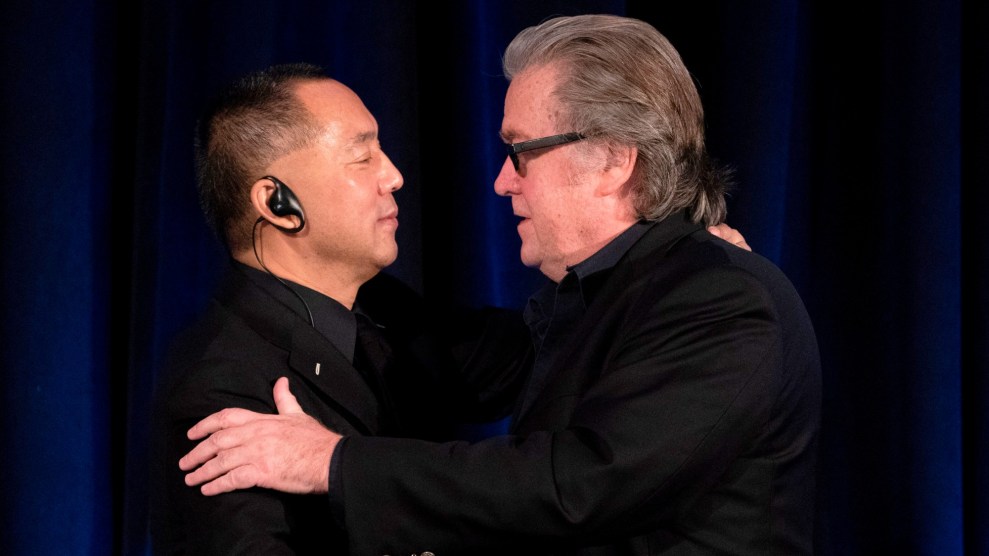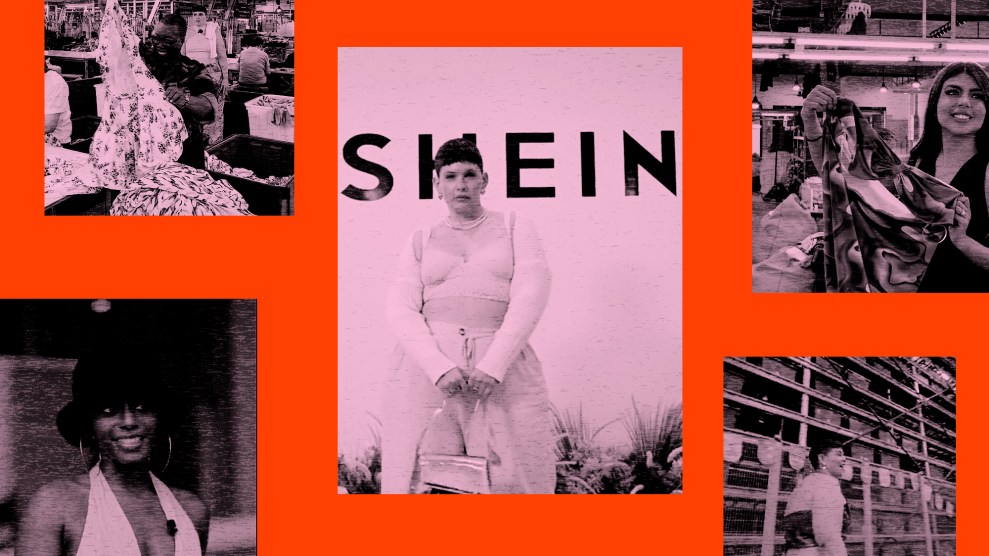
Mother Jones; TikTok
A group of American influencers is in hot water for attempting to frame the controversial fast fashion giant Shein, which has been plagued by accusations of using forced labor, as an ethical brand during a recent sponsored trip to the company’s Guangzhou, China factory.
“They only invited people with zero critical thinking,” one critic sounded off on Twitter as clips of the visit went viral. Others blasted the group, which mostly included people of color and plus-size individuals, for promoting Shein’s “propaganda.”
The fury could not come at a worse time for Shein as the company reportedly hopes to go public in the US this year. But for those who have watched Shein’s rapid rise over the years, the June event is simply yet another addition to the company’s long record of abuse allegations. Stealing brands from smaller designers? Those claims abound. Subjecting garment workers to awful working conditions, including dismally low wages for a 75-hour work week? Yep, that’s been alleged too. Disastrous effects on the environment? That too. Selling $15 dresses while being valued for billions? That’s a fact. Even Congress has stepped in to investigate, with a recent report finding Shein regularly relies on trade loopholes in order to avoid human rights reviews.
Yet even in the face of relentless ethical scandals, Shein remains one of the world’s most popular brands among Gen-Z and millennial customers. I reached out to Aja Barber, author of the book Consumed: The Need for Collective Change: Colonialism, Climate Change, and Consumerism, to learn more about the culture of overconsumption that social media has created and the role influencers play in fast fashion’s success.
What was your reaction to the Shein influencer trip?
I wasn’t surprised. But it is interesting that judging by the widespread disapproval, the rest of the internet is starting to pick up on it.
How would you describe Shein’s place in the fast fashion world, in comparison to similar brands?
While a lot of the mainstream big box stores that we see are fast fashion, Shein has perfected the formula. They’re so much bigger, and so much faster. Technically speaking, they’re so much more savvy than a lot of the big box stores and that’s why they’re tenfold beating them all with their own game. If I didn’t hate this business and this model, I would be like “Congratulations,” but in actuality, they’ve just succeeded at being the absolute worse.
Is it even possible for fast fashion to be sustainable?
The entire model of fast fashion isn’t sustainable. You can’t have sustainable or ethical fast fashion. It needs to slow down to be those two things.
Since fast fashion’s business model allows brands to set their products at an absurdly low price, many argue that its existence is justified because allows low-income people to buy trendy clothes. What often isn’t brought up are the often exploited garment workers in these factories. Your thoughts on this erasure?
The erasure of exploited people from the conversation of sustainable fashion has allowed people to feel okay about this system. Without actually discussing the people that make the clothing who happen to be the most impoverished in this conversation. This really is a dishonest conversation where we’re just justifying our consumerism. If we’re going to talk honestly about classism, let’s talk honestly. But without mentioning the people that make the clothing, who are trapped in wage slavery, you’re not being honest.
Can you describe the role that influencers play in making Shein a household name?
I definitely saw more of this on Tik Tok than on Instagram. But in general, without influencers, this whole fast fashion model looks entirely different. If you are someone who’s really good at affiliate linking and you’re selling a lot of clothing, then arguably, you are a huge part of the fast fashion problem.
I don’t think that we should be banding together to internet-bully individuals. But pretending like influencers aren’t a part of this wheel of consumption is completely shortsighted.
Can you describe the role that the social media platforms themselves play in this?
I would argue that social media was a godsend for profit margins for fast fashion companies because it’s the cheapest marketing you can get. Some people will happily take gifted items from a brand. They don’t have to pay for it, and then they share it. A single influencer can definitely sell thousands of garments very quickly, much quicker than traditional media. Brands have basically found a new way to exploit people. I think a lot of people with platforms don’t realize that, in many ways, they’re being exploited as well.
Several people on social media, yourself included, have pointed out the marginalized identities of the influencers who attended the brand trip. Is it a coincidence that influencers who are plus-sized and racial minorities historically make less than their thin, white counterparts?
I look at this landscape, and I’ve been watching it for years. The people that made the most amount of money when fast fashion was really getting going were thin and white. Some of them were already independently wealthy, so they didn’t even need to do it. Now they’re all moving on.
Fast fashion is quickly becoming this smelly thing that you don’t really want following you around. But these companies also realize marginalized communities’ desperation to be included and that telling minority creators they have a seat at the table is pretty powerful. And so while the people that made the five and six figures deals years ago are happily skipping into the sunset because now they care about sustainability.
Now, after they made the most amount of money in the conversation, you’re going to be left there holding the bag. And these fast fashion companies are even getting you at a discount because they’re not paying you as much as that person got paid. I really want marginalized people to understand a brand that exploits marginalized people is exploiting you as well. You just don’t realize.
Are there ways for influencers to be more responsible about the brands they choose to work with?
It’s really hard because if you want to make a living from selling clothing with this model, you’re going to have to work with fast fashion. The reality is that we shouldn’t be aspiring to make a living that way. The vast majority of the brands that can afford to do the massive campaigns are going to be fast fashion brands. Additionally, 90 percent of the money in the fashion industry is going to just a handful of brands, which means that ethical and sustainable brands generally do not have the marketing dollars to pay influencers what they’re expecting from brands.
So until we even the playing field, people probably shouldn’t expect ethical brands to have massive six-figure campaigns going because that just isn’t how ethical fashion works until the world change.
I’m sure for many that’s got to be a hard pill to swallow.
I think a lot of influencers sign up for it and don’t realize that brands have influencers right where they want them. There are a lot of people that are just willing to do things for free because they think that it will lead to bigger things. So even ten years ago, influencers getting five-figure deals was a pretty common thing. That’s changed because the influencer market has become super flooded.
I don’t have any good advice about selling clothing except don’t aim to be a millionaire because you’re probably not going to get that in an ethical way. And that’s okay. Because you don’t need to be a millionaire to have a nice life. Ethical fashion is not going to make you super-duper rich. But it’ll mean you can sleep at night, which I like. I think there’s a lifestyle that people want to achieve with influencing and I’ve never aspired to that lifestyle.
This interview has been edited for length and clarity.



